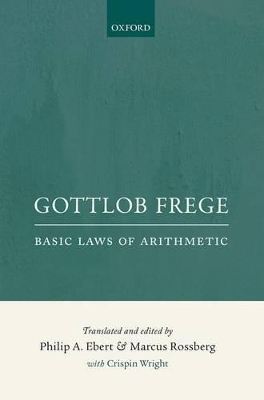
Gottlob Frege: Basic Laws of Arithmetic
Seiten
2013
Oxford University Press (Verlag)
978-0-19-928174-9 (ISBN)
Oxford University Press (Verlag)
978-0-19-928174-9 (ISBN)
This is the first complete English translation of Gottlob Frege's Grundgesetze der Arithmetik (1893 and 1903), with introduction and annotation. As the culmination of his ground-breaking work in the philosophy of logic and mathematics, Frege here tried to show how the fundamental laws of arithmetic could be derived from purely logical principles.
The German philosopher and mathematician Gottlob Frege (1848-1925) was the father of analytic philosophy and to all intents and purposes the inventor of modern logic. Basic Laws of Arithmetic, originally published in German in two volumes (1893, 1903), is Freges magnum opus. It was to be the pinnacle of Freges lifes work. It represents the final stage of his logicist project the idea that arithmetic and analysis are reducible to logic and contains his mature philosophy of mathematics and logic. The aim of Basic Laws of Arithmetic is to demonstrate the logical nature of mathematical theorems by providing gapless proofs in Frege's formal system using only basic laws of logic, logical inference, and explicit definitions. The work contains a philosophical foreword, an introduction to Frege's logic, a derivation of arithmetic from this logic, a critique of contemporary approaches to the real numbers, and the beginnings of a logicist treatment of real analysis. As is well-known, a letter received from Bertrand Russell shortly before the publication of the second volume made Frege realise that his basic law V, governing the identity of value-ranges, leads into inconsistency. Frege discusses a revision to basic law V written in response to Russells letter in an afterword to volume II.
The continuing importance of Basic Laws of Arithmetic lies not only in its bearing on issues in the foundations of mathematics and logic but in its model of philosophical inquiry. Frege's ability to locate the essential questions, his integration of logical and philosophical analysis, and his rigorous approach to criticism and argument in general are vividly in evidence in this, his most ambitious work.
Philip Ebert and Marcus Rossberg present the first full English translation of both volumes of Freges major work preserving the original formalism and pagination. The edition contains a foreword by Crispin Wright and an extensive appendix providing an introduction to Frege's formal system by Roy T. Cook.
The German philosopher and mathematician Gottlob Frege (1848-1925) was the father of analytic philosophy and to all intents and purposes the inventor of modern logic. Basic Laws of Arithmetic, originally published in German in two volumes (1893, 1903), is Freges magnum opus. It was to be the pinnacle of Freges lifes work. It represents the final stage of his logicist project the idea that arithmetic and analysis are reducible to logic and contains his mature philosophy of mathematics and logic. The aim of Basic Laws of Arithmetic is to demonstrate the logical nature of mathematical theorems by providing gapless proofs in Frege's formal system using only basic laws of logic, logical inference, and explicit definitions. The work contains a philosophical foreword, an introduction to Frege's logic, a derivation of arithmetic from this logic, a critique of contemporary approaches to the real numbers, and the beginnings of a logicist treatment of real analysis. As is well-known, a letter received from Bertrand Russell shortly before the publication of the second volume made Frege realise that his basic law V, governing the identity of value-ranges, leads into inconsistency. Frege discusses a revision to basic law V written in response to Russells letter in an afterword to volume II.
The continuing importance of Basic Laws of Arithmetic lies not only in its bearing on issues in the foundations of mathematics and logic but in its model of philosophical inquiry. Frege's ability to locate the essential questions, his integration of logical and philosophical analysis, and his rigorous approach to criticism and argument in general are vividly in evidence in this, his most ambitious work.
Philip Ebert and Marcus Rossberg present the first full English translation of both volumes of Freges major work preserving the original formalism and pagination. The edition contains a foreword by Crispin Wright and an extensive appendix providing an introduction to Frege's formal system by Roy T. Cook.
Philip A. Ebert received his PhD from the University of St Andrews in 2006 and was a Post Doctoral Fellow at the Arché Centre from 2005-2007. Since 2007 he has worked at the University of Stirling. ; Marcus Rossberg received his PhD from the University of St Andrews in 2006 and was a Post Doctoral Fellow at the Arché Centre from 2005-2008. Since 2008 he has worked at the University of Connecticut.
Introduction by Crispin Wright ; Translators' Introduction ; Frege: Basic Laws of Arithmetic, volumes I and II. ; Translators' Notes ; Bibliography ; Appendix by Roy T. Cook ; Index
| Erscheint lt. Verlag | 31.10.2013 |
|---|---|
| Übersetzer | Philip A. Ebert, Philip A. Ebert, Marcus Rossberg |
| Verlagsort | Oxford |
| Sprache | englisch |
| Maße | 181 x 249 mm |
| Gewicht | 1226 g |
| Themenwelt | Geisteswissenschaften ► Philosophie ► Geschichte der Philosophie |
| Geisteswissenschaften ► Philosophie ► Logik | |
| Geisteswissenschaften ► Philosophie ► Philosophie der Neuzeit | |
| Mathematik / Informatik ► Mathematik ► Allgemeines / Lexika | |
| Mathematik / Informatik ► Mathematik ► Geschichte der Mathematik | |
| ISBN-10 | 0-19-928174-2 / 0199281742 |
| ISBN-13 | 978-0-19-928174-9 / 9780199281749 |
| Zustand | Neuware |
| Haben Sie eine Frage zum Produkt? |
Mehr entdecken
aus dem Bereich
aus dem Bereich
die kolonialen Wurzeln der französischen Theorie
Buch | Hardcover (2024)
Matthes & Seitz Berlin (Verlag)
28,00 €
oder Das Leben Montaignes in einer Frage und zwanzig Antworten
Buch | Softcover (2023)
C.H.Beck (Verlag)
18,00 €


